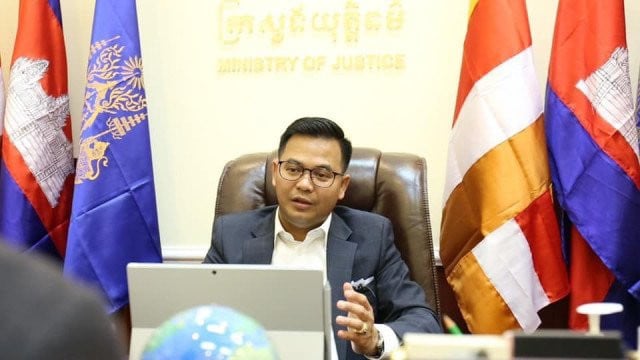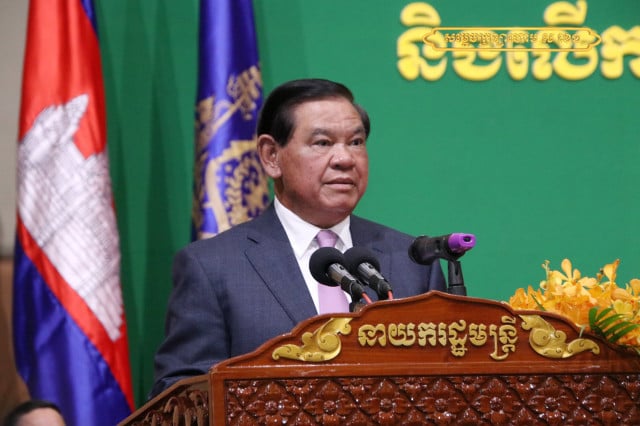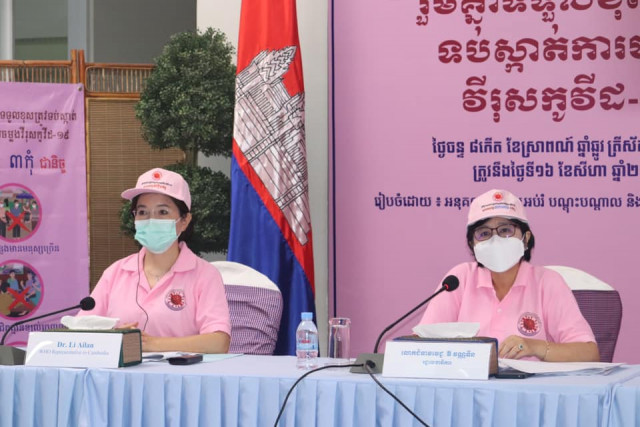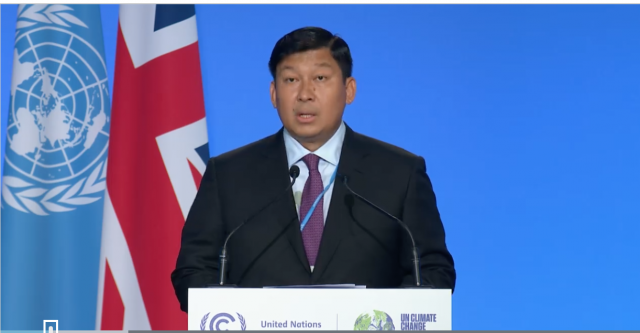Justice Ministry Denies “Pressure” Led to Release of 27 Activists

- By Mao Sopha
- and Gerald Flynn
- November 16, 2021 2:30 PM
Rights groups on the other hand point to the government’s lack of concern for overcrowding in prisons during the pandemic and cite international pressure as likely explanation for mass release
PHNOM PENH--Ministry of Justice spokesperson Chin Malin on Nov. 15 reiterated that the government had released political prisoners and jailed activists in line with court procedures and once again stressed that it was not due to foreign pressure.
“This case is not a matter of pressure [from foreign powers], it's a court proceeding that generally applies not only to activists. The court does not focus on either activists or non-activists,” he said.
Between Nov. 5 and Nov. 15, Cambodia released 27 political, environmental and social activists from Correctional Centers 1 and 2, Phnom Penh Jail and Kampong Speu Provincial Prison.
These included prominent trade unionist Rong Chhun, along with seven known Cambodia National Rescue Party (CNRP) activists and former officials, five youth activists from the Khmer Thavrak group, two activists from the Khmer Student Intelligent League Association, President of Khmer Win Party Suong Sophorn, six environmentalists from Mother Nature Cambodia and five of the Friday Women.
Malin, however, contested the idea that these 27 activists had been released.
“They have committed offenses and been convicted by the courts, but the execution of sentences was favored preferentially based on the guidelines of the Ministry of Justice under the campaign to expedite the resolution of cases, resolve congestion in court and reduce overcrowding in prisons,” Malin said.
Overcrowding in Cambodia’s prisons has long posed a threat to the health of inmates and prison staff, but the COVID-19 pandemic saw renewed calls from rights groups and the World Health Organization to address the potential crisis. Cambodia’s Prisons Department was slow to react, as was the Justice Ministry, leaving some 39,000 inmates in facilities across Cambodia as recently as June 2021—said facilities were designed to hold just 27,000.
International rights advocates found in May 2021 that more than 35 percent of Cambodia’s inmates had not had their day in court, but while the government maintained that it was reducing the prison population, some 700 people were rounded up and jailed under a new COVID-19 law following the Feb. 20 outbreak, according to UN Special Rapporteur on Human Rights in Cambodia Vitit Muntarbhorn.
Keut Rith was appointed as Justice Minister in 2020 with a publicly stated goal of reducing congestion in courts and addressing the dangerous levels of overcrowding in prisons—27 of Cambodia’s 28 prisons were operating at more than 100 percent occupancy capacity earlier this year. However, Rith has repeatedly claimed his campaign a success.
He said that the campaign is part of providing timely justice to the people and can reduce prison overcrowding with the implementation of the three stages—prosecution, investigation and trial.
Malin said that although the campaign has since ended, the Justice Ministry is still encouraging the courts to further policies that resolve overcrowding in prisons, speed up court proceedings and reduce congestion among court cases, but added that all this must be done based on legal principles and procedures.
As recently as May 2021, Malin had said he was against the release of prisoners to reduce overcrowding and the risk of COVID-19, saying that mass releases of detainees would “affect social stability” in Cambodia.
However, as Malin pointed out, the 27 activists released this month all remain under judicial probation for three years, during which the court can summon them at any time and they are required to report back to the courts should they wish to change their address, job or leave the country for any reason.
“If any individual violates the terms of their probation that is imposed by the court, they will face the law and will return to prison to serve their sentences,” Malin added.
Should they be returned, the activists would be joining the estimated 60 other political prisoners still held behind bars across Cambodia. Plus, while 27 activists were released, two Cambodian refugees living in Thailand were detained by Thai authorities and delivered to Cambodian police who promptly jailed the two on charges of incitement. The government has denied requesting the initial arrests from their Thai counterparts, but such deals have been cut before and the two nations have a reputation for trading exiled dissidents.
But speculation can only remain as to the real reasons that have influenced the government’s decision to cut loose 27 political prisoners in the space of 10 days—some assessments place emphasis on the US Treasury Department’s recent business advisory which warned US companies about investing in Cambodia due to the risk of “corrupt business practices, criminal activities, and human rights abuses.”
Similarly, the Nov. 10 business advisory added that it would be reviewing the eligibility criteria for the Generalized System of Preferences (GSP)—a trading scheme that has slashes import tariffs and quotas—which has helped Cambodian exports to the US rise to $6.6 billion in 2020, a 185 percent increase since 2010.
“This assessment will be conducted following reauthorization of the program benefits and will include any new or amended eligibility criteria established by Congress,” the advisory read, hinting that human rights abuses may become a disqualifying criterion for GSP access.
Whether the threat of losing access to the US’ GSP was enough to see 27 political prisoners freed remains unclear, but following the European Union’s decision to partially revoke access to its own preferential trader scheme over human rights concerns, most analysts have suggested GSP likely played some role in this decision.
Others have suggested the upcoming Asia-Europe Meeting (ASEM) summit scheduled to take place on Nov. 25 in Phnom Penh could have factored into the government’s decision to release the activists so as to avoid international condemnation.
“The release of 26 wrongfully detained political prisoners is good news, but there is nothing to stop the Cambodian authorities from rearresting them at any time,” said Brad Adams, Asia director at Human Rights Watch. “Governments, in particular European Union participants to the Asia-Europe Meeting Summit in Phnom Penh in late November, should press the Cambodian government to drop the conditions imposed on those released and unconditionally free all remaining political prisoners.”
Similarly, the upcoming commune elections set for June 2022 and Cambodia’s current role as chair of ASEAN have also been suggested as potential factors involved in securing the release of prisoners, although ASEAN’s approach to human rights suggest there would be less concern from the bloc and Cambodia’s de facto one-party nature also reduces the importance of the forthcoming elections.
“Cambodia’s prisoner releases show the government’s apparent concern for the international response to the ASEM meeting and the spotlight it will have as the chair of ASEAN in 2022,” Adams said. “The EU, US, donors and other friends of Cambodia should press Prime Minister Hun Sen to end the cynical game of revolving prison doors where some people are released, and others take up their places in the same prison cells.”















